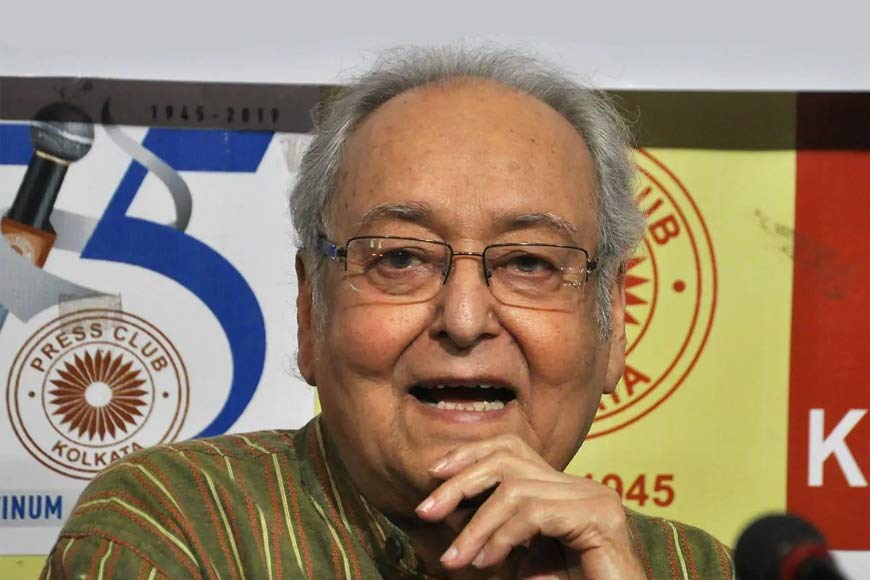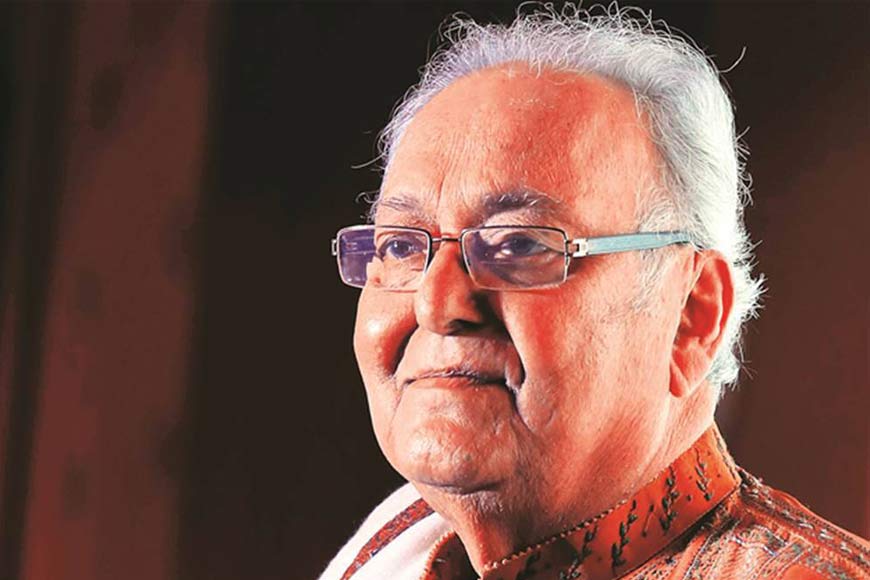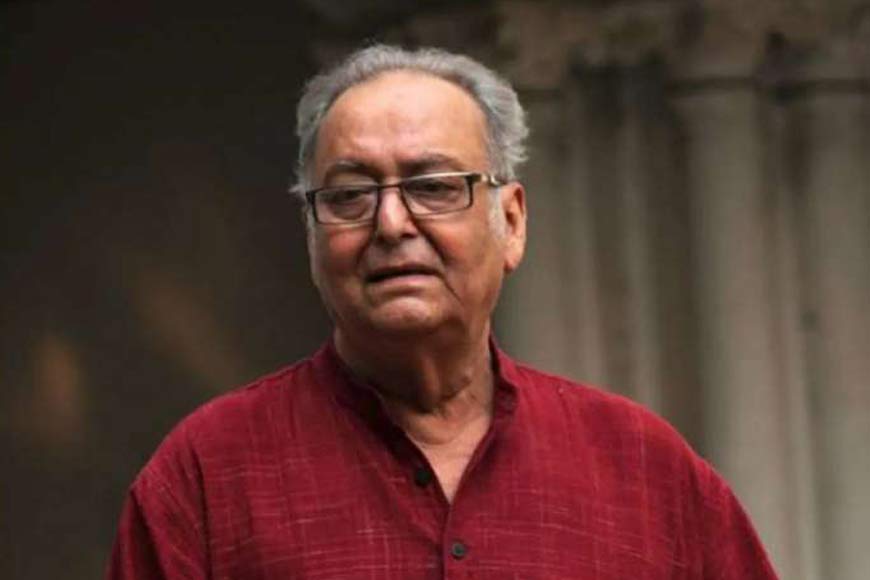Farewell, Feluda

Nearly two decades ago, as a nervous young reporter, I was assigned to do an interview with Soumitra Chattopadhyay, my first meeting with him. Because he had very little time to spare, he asked me to ride in his car, so we could finish the interview on the move. In the midst of answering a question, he suddenly broke off to point to a government billboard and say, "Uff, porishe babanan bhul (they have misspelled 'porisheba', meaning service)!" Abruptly, he turned back to me and asked, "Tumi janobanan ta? Bolo dekhi(can you spell it)?" Obediently, I spelled it out, correctly. Visibly pleased, he simply said, "Achhabesh (equivalent to "well done", in this case)."
This little anecdote is intended to highlight not my spelling abilities, but Soumitra Chattopadhyay's eye for detail, and obsession with perfection, when it came to words, language, and presentation. The same obsession that made his diction and expressions so perfect, on stage and on screen, whether acting or simply speaking.
The fact that Soumitra Chatterjee is no more, that his 85-year journey has come to an end, is a shattering blow not just to Bengali cinema or theatre, but Bengali culture as a whole. So deep is the impact that it is hard to know where to begin counting our losses.
The fact that Soumitra Chatterjee is no more, that his 85-year journey has come to an end, is a shattering blow not just to Bengali cinema or theatre, but Bengali culture as a whole. So deep is the impact that it is hard to know where to begin counting our losses. The only silver lining, if it can be called that, is the enormous body of work he leaves behind, which is like a finishing school for any young actor, writer, elocutionist, or even a director.

One would be hard pressed to think of any other actor in the history of Bengali cinema with such varied talents. From the time he burst upon the scene as the handsome young idealist in Satyajit Ray's 'Apur Sansar' (1959), to his searing presentation of an old, ravaged king in Suman Mukhopadhyay's play 'Raja Lear' (2011), to his deliciously sinister portrayal of Gautam Sadhu in Sujoy Ghosh's short film 'Ahalya' (2015), Soumitra Chatterjee has never failed to surprise or captivate.
The Wikipedia page on Soumitra Chatterjee lists him as 'actor, thespian, poet, writer, playwright, play director, reciter, and painter'. The wonder of it all is that much of this came to him naturally, the result of an upbringing which included a generous exposure to both theatre and literature.
Once again, to talk only about his acting would be to severely limit the impact he has had on Bengali culture as a whole, despite his repertoire of well over 200 films. The Wikipedia page on Soumitra Chatterjee lists him as 'actor, thespian, poet, writer, playwright, play director, reciter, and painter'. The wonder of it all is that much of this came to him naturally, the result of an upbringing which included a generous exposure to both theatre and literature. Inspired by a stage performance by legendary stage actor Sisir Bhaduri, the young Soumitra had found his calling pretty early in life, but the dedication and perfection that he brought to his chosen profession was entirely his own.
I remember watching him as he prepared to go on stage for the inaugural performance of 'Boshtomi', which he himself had adapted as a play, based on a Rabindranath Tagore short story, in 2016. Sitting alone and silent in a corner, he was apparently staring into space, looking at nothing and no one in particular. Perhaps failing to appreciate his need for solitude, a young man approached him for an autograph, and was curtly dismissed. But as he walked sheepishly away, Soumitra babu called him back. "Listen, don't take this personally," he said. "I'm just trying to focus. If I don't, my co-actors will suffer. Which means the play will suffer."
The consummate professional in him always saw the bigger picture, and the strength of his self-respect and sense of dignity gave him the ability to wholeheartedly honour his colleagues.
The consummate professional in him always saw the bigger picture, and the strength of his self-respect and sense of dignity gave him the ability to wholeheartedly honour his colleagues. On one occasion, possibly his 70th birthday celebration, I remember asking him who among his co-actors he respected more than others. He took his time answering, and I was fully expecting to hear Uttam Kumar's name, given the constant comparisons between them at the peak of their stardom. But Soumitra babu's response took me by surprise. "I would have to say Sabi (Sabitri Chatterjee). With anyone else, I was confident that I could hold my own. But she is such a powerful actress that if you give her an inch, she will take the entire scene away. So I would rehearse multiple times when I had to shoot with her."

Not that he had too many opportunities to do so. Their last, and perhaps most memorable, appearance together was in 'Prakton' (2016) directed by Shiboprasad Mukherjee and Nandita Roy, where he played the perfect, quiet foil to her loud comic genius. This was certainly one pairing that viewers would have loved more of, much like Soumitra-Uttam. Understandably, two male stars at the height of their popularity could not be expected to share screen time too often, but films such as 'Jhinder Bondi' (1961), 'Stree' (1972), and 'Devdas' (1979) left viewers hungry for more.
Over the years, he was vocal about his disappointment, and his feeling that the National Film Awards committee was biased in favour of popular and mainstream cinema. In a gesture of protest, he had turned down the 2001 Special Jury Award for Goutam Ghose’s‘Dekha’.
Fans of the two may have been eternally divided about who was the better actor, but for the average Bengali cinema goer, the fact that two such brilliant men graced the film industry at the same time was nothing short of a privilege.
Why did Soumitra Chattopadhyay never really extend his horizon beyond Bengal? As a film critic once told me, quite frankly, he didn't need to. His national and international fame had been ensured by Satyajit Ray, to the extent that even today, cinema lovers around the world associate the two names without thinking. It is difficult to imagine what more Soumitra babu could have achieved had he ventured into Bollywood, for example, or even international cinema. Films such as 'Apur Sansar',‘Charulata', 'Abhijaan', 'AranyerDinratri', ‘AshaniSanket’, 'Sonar Kella', 'Joy Baba Felunath', and ‘Ganashatru' have cemented the Satyajit-Soumitra legend to the extent that anything more seems superfluous.
Also read : Our last bastion
Not that Soumitra babu himself would necessarily agree with this assessment. I remember him asking once, “Would you say the traffic was entirely one-sided? Who else could Manikda (Ray) have cast in those roles had I not been available?” For those who think this was arrogance, it was simply an honest appraisal of his own worth. Which is why it seems ironic that it took the National Awards committee until 2006 to recognise that worth and honour him with his first Best Actor award for Suman Ghosh’s forgettable film ‘Podokkhep’, an award that Soumitra babu himself did not attach much importance to, by his own admission.
In 1999, he became the first Indian actor to receive the ‘Officier des Arts et Metiers’, the highest award for arts given by the French government. And in 2018, he was presented France’s highest civilian award, the Legion d’Honneur.
Having worked with directors of the calibre of Satyajit Ray, Tapan Sinha, and Mrinal Sen, Soumitra babu himself was keenly aware of the irony. Over the years, he was vocal about his disappointment, and his feeling that the National Film Awards committee was biased in favour of popular and mainstream cinema. In a gesture of protest, he had turned down the 2001 Special Jury Award for Goutam Ghose’s‘Dekha’. In a subsequent interview, he said“...the National Film Awards overlooked my performances in several powerful roles...When I did ‘Koni’, Shashi Kapoor was adjudged the best actor. Anil Kapoor was feted (Best Actor) for ‘Pukar’ while ‘Dekha’ was awarded a ‘consolation’ prize…”
The international community, most notably France, was slightly ahead of Soumitra babu’s own country in this respect. In 1999, he became the first Indian actor to receive the ‘Officier des Arts et Metiers’, the highest award for arts given by the French government. And in 2018, he was presented France’s highest civilian award, the Legion d’Honneur. Handing over the award, French Ambassador Alexandre Ziegler said, “France loves you as much as you love France.” In the interim, he agreed to accept a Padma Bhushan from then Indian President APJ Abdul Kalam in 2004, having declined the Padma Shri on an earlier occasion.
Official recognition notwithstanding, the passing of Soumitra Chattopadhyay can only perhaps be compared to the passing of Satyajit Ray. Bengal has lost yet another multi-talented, instantly recognisable global icon, and losses such as these, as history has shown, often prove irreplaceable. From now on, there will only be memories of brilliance.









